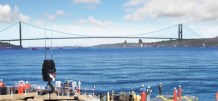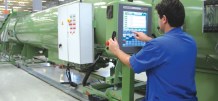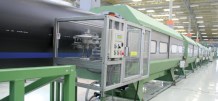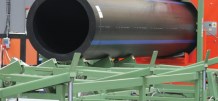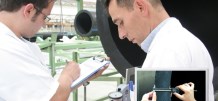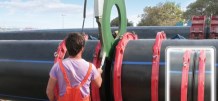The Bosporus has been crossed with the Special Pipes of Fırat, the risk of water supply shortage has been eliminated
Istanbul's expected water shortage problem has been solved by supplying the Asian and European sies in a balanced way, through the investments, undertaken by ISKI, with the utilization of a very special PE 100 pipe, produced for the first time in the world by Fırat, being able to show a resistance to the pressure, amounting to 16 bar, with a diameter of 1200mm, enabling the “Bosporus crossing”.
The drinking water, which is being brought by ISKI, from the Melen Brook to the Ömerli Dam, is crossing the Bosporus from the sea floor with the thickest pipes of the world, produced by Fırat, between Salacak and Sarayburnu. From this point, it is forwarded to the Yenikapı Facilities and 300 thousand cubic meter water is being pumped to the European side.
For the "Bosporus Crossing Project " a specially developed pipe has been used from the 3rd generation LS class polyethiylene, withstanding an operating pressure of 16 bars, and 1200mm diameter. The wall thickness of the pipes for this diameter is the highest in the world. The service life span is at least 100 years. The material tiredness starts after 100 years. PE 100 pipe is being manufactured from the material with 0,955 g/cm3 density, which does not sink into the water and in this project the pipes are being kept at the sea floor level by placing concrete blocks on the pipes.
Each pipe, being manufactured is 13m long and has a weight of 5 tons. The project pipes, whose total length is 4.000m has been produced in Fırat’s Büyükçekmece plany, which is one of the top five plastic production complex, by Turkish engineers and workers.
The manufacturing of pipes, withstanding a pressure of 16 bars and with 1200 milimeter diameter has been effectuated for the first time in the world.
The manufactured pipes have been transported to ISKI-Sarayburnu facilities via land transport and at this facility the butt welding operation has been accomplished by the engineers and technicians of Fırat. The PE 100 pipes, which are connected by the "But welding" method, has been installed as two adjacent lines and as groups of 52m between Sarayburnu and Salacak. The instalation of the pipes to the Bosporus has been effectuated by the ships, with the "under the sea pullling method”. The pipes have been fixed under 50m depths of Bosporus with concrete rings. Due to the our production of the “thickest pipes of the world”, the “Bosporus Crossing Project” has brought about a tremendeous saving of both the instllation duration and costs.
The opinions of Mehmet Erdoğdu, the Technical Manager of Fırat Infrastructure is as the following:
The plastic materials, which are being obtained from the petroleum derivatives, has entered into a rapid development stage after their discoveries in the 1950s. The latest technology, which has been attained today, is the PE 100 class, which is the last generation of the PE pipe material.
Due to its high advantages, due to its structure, it has been preferred for the Bosporus Crossing Project. To summarize the advantages of PE 100 as the following would be, long service life span, high capacity for flexibility, that it is not prone to corrosion, not changing te color and taste of the water, and not being affected by the sea water.
The PE 100 pipes are being safely used due to these features since years for the sea crossings and against seismic movements in our country, located on the seismic belt.
The PE 100 pipes are connected with butt welding and electrfusion welding methods. The pressure and non-leakage is being sustained through both methods. Another alternative pipe classes present disadvantages such as high cost measures taken against corrosion, the length of the duration and the height of the costs of connecting methods, having less flexibility or breaking problem in some of the pipe classes.
As to mention further regarding the PE 100 pipe, which has been used in the “Bosporus Crossing Project”: the diameter of the pipe, we are producing, is 1200 mm, with a wall thickness is 110 mm. Having a resistance to 16 bar operating pressure, the service life span is at least 100 years. The material tiredness starts after 100 years.
The PE 100 pipe is produced from the material, with 0,955 g/cm3 density and which does not sink into the water. In this project, maintaining the pipes at the sea floor level is enabled via concrete blocks.
The manufactured pipes have been transported after passing a seies of tests, defined by the norms. The fact, we would like to specifically underline here is that the pipe, having a wall thickness of 110 mm, has not been produced yet in the world.
Two issues appear into the picture as far as pipe manufacturing is concerned. The first is due to usage of different raw material. The production has been effectuated with the raw material, which we call LS, low sagging, which is a different derivative of PE 100, which has the ability to flow slowly under heat.
The choice of LS raw material is for sure not solely sufficient for the production of the pipes. Therefore, the second important aspect is the improvements, which we have effectuated on the production lines.
With our team, having a technical knowledge and experience, dating back to long years, we have planned a series of design changes on our production lines and by implementing these plans, we have atained a world record.
The opinions of Mehtap Uluceviz, the Sales Manager of Fırat Infrastructure is as the following:
The major problem of Istanbul namely the draught and the water shortage related to it, which is on the agenda recently, is reaching a solution hanks to the high sensitivity and courage of ISKI.
The drinking water, which is being brought by ISKI from the Melen Brook, is is crossing the Bosporus from the sea floor with the thickest PE 100 pipes of the world, withstanding a pressure of 16 bar, with a diameter of 1200mm specially produced by Fırat fort he first time, between Salacak and Sarayburnu and 300 thousand cubic meter water is being pumped to the European side.
Given the fact that here are many types of the pipes, it needs to be taken into account that there is for sure a reason as to why ISKI has preferred PE 100 pipes for this project.
The Bosporus in Istanbul has has a dual direction stream and a high flow rate due to differnece between the Black Sea and Marmara Sea’s density of sea water. Due to this characteristic, Bosphorus is known to be one of the sea passages in the world, which is hard to cross.
These difficult conditions necessitate the usage of pipe systems, which have the ability of high flexibility. Due to this feature, it is in harmony with the sea movements, such as turbulance, resonance and vibration.
Due to the chemical raw material of PE 100, the feature that is is not being affected by the sea water and that it does not cause any corrosion are very important aspects. It is distinguishing itself form some other pipe systems, which requies the implementation of catodic protection.
Let us summarize some of the other advantages of the PE 100 pipes;
Not changing the odor and taste of the drinking water and that it is hygenic, and assuring durability in terms of pressure and non-leakage due to reliability of connecting methods, not being affected by the beats and hits.
One of the most important issues is the sudden increase or decrease of the pressure in the pipe line. PE 100 pipes respond to the sudden pressure increases or decreases in the system with flexibility and pressure decisiveness. And PE 100 pipe does not explode under these circumstances.
For the solution of Istanbul's water problem, the production of a pipe, which was not produced so far, by the knowledgable and experienced FIRAT team by working hard day and night, has made us proud and excited. Because the pipe we have produced and the “Bosporus Cossing Project”, in which this pipe has been used, is a first on earth and it has entered into the literature.
